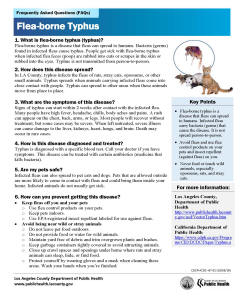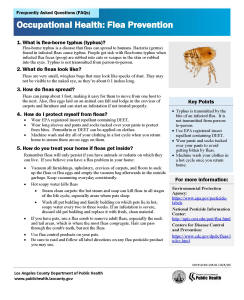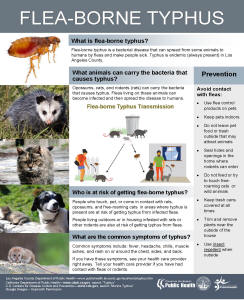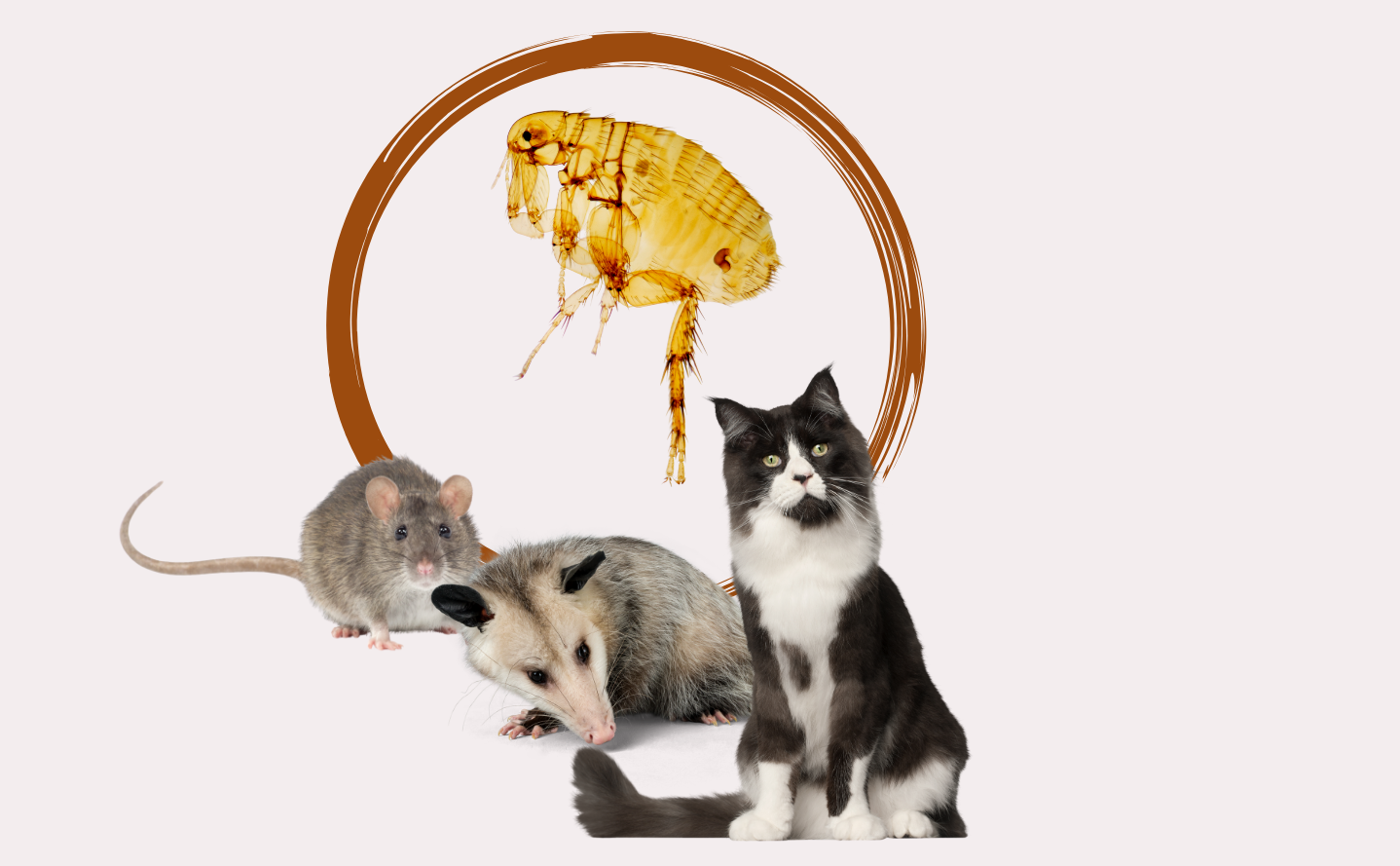
What is Flea-borne (Endemic) Typhus (FBT)?
- Flea-borne typhus (sometimes called murine typhus) is an acute febrile illness and is caused by the Rickettsia (R.) typhi bacteria.
- Flea-borne typhus can spread to humans from bacteria found in infected fleas. Infection occurs when feces from infected fleas are rubbed into cuts or scrapes on the skin or rubbed into the eyes.
- Typhus is not transmitted from person to person.
FBT Data
FBT has increased in LA County since 2010. In 2024, a record-high 187 cases were documented. The observed increase in typhus cases has been widespread throughout the County however, localized clusters and outbreaks have been identified primarily in Central Los Angeles and South Los Angeles areas. FBT cases occur year-round but tend to peak during the late summer and fall months. For more detailed information, visit the LA County Acute Communicable Disease Control Disease Surveillance Data Dashboard: http://dashboard.publichealth.lacounty.gov/acdc_annual_report_dashboard/.
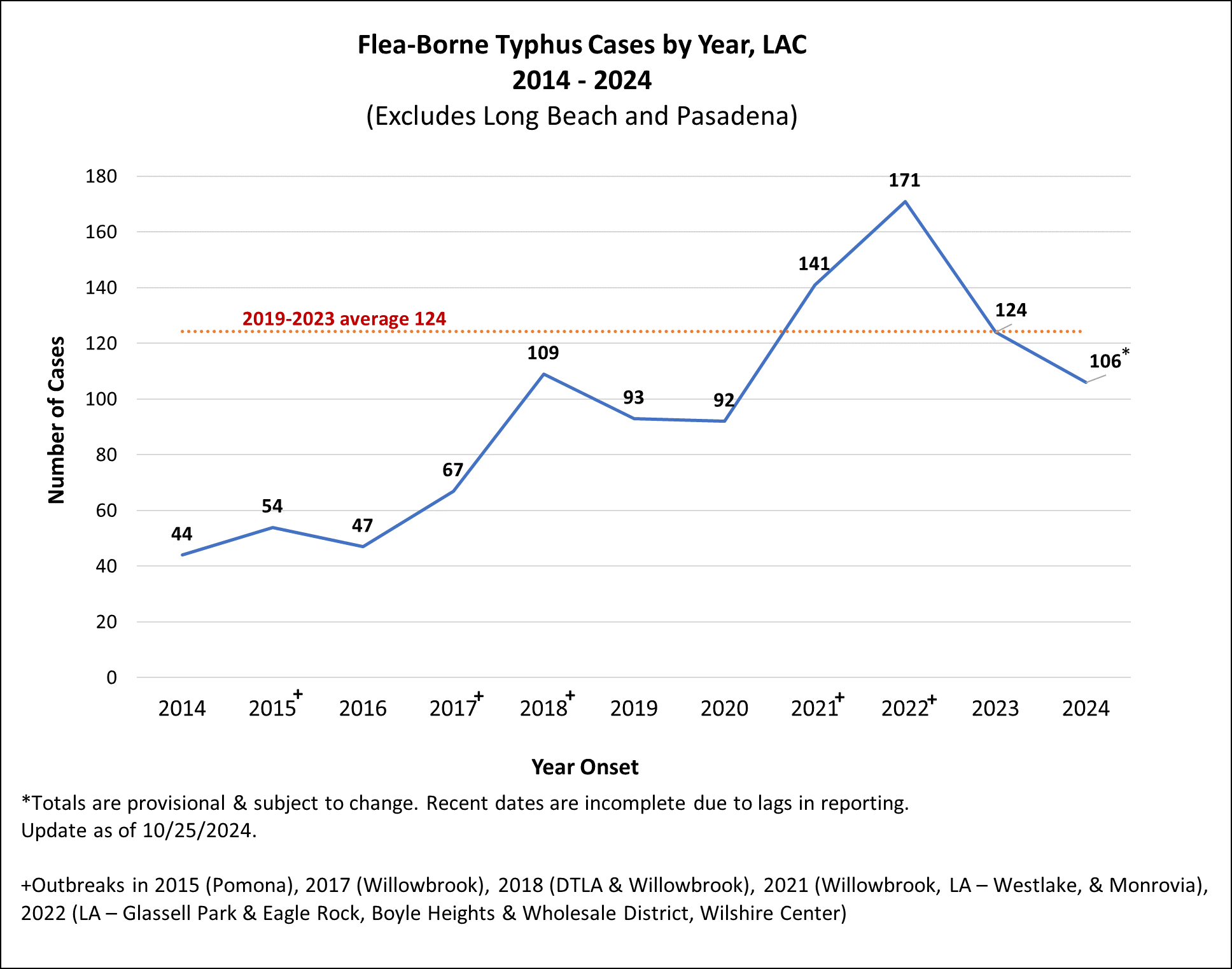
Transmission and Prevention
In LA County, the primary animals known to carry infected fleas include rats, free-roaming cats, and opossums. People with exposure to these animals are at risk of acquiring flea-borne typhus. Pets, such as dogs and cats, that are allowed outside may also come into contact with infected fleas and could carry them to humans. Infected animals are not known to get sick from flea-borne typhus.
Prevention tips:
- Use flea control products for domestic pets.
- Store trash and other food sources, including pet food and food waste for composting, in secured bins and/or clear them away from places of residence to avoid attracting animals.
- Discourage animals from nesting around your home by closing crawl spaces and attics and trimming or removing vegetation around buildings.
- Avoid petting or feeding free-roaming animals.
- When outside, consider using EPA-registered insect repellents.
Symptoms and Treatment
FBT can be a mild, self-limited illness, or it can present as a severe disease requiring hospitalization . Symptoms start within two weeks after contact with an infected flea and may include:
- Fever
- Headache
- Muscle pain/myalgia
- Nausea/vomiting
- Rash sparing the palms and soles
Rarely, swelling may occur at the lining of the brain (meningitis) or in the heart valves (endocarditis). Fatalities are uncommon, but have been observed. The first FBT deaths since 1993 in LA County were reported in 2022 (see MMWR report).
There are no vaccines to prevent FBT. FBT can be treated with antibiotics. Doxycycline is the treatment of choice.
Information for Clinicians and Healthcare Professionals
Providers should consider a diagnosis of flea-borne typhus in patients of all ages with a non-specific febrile illness with headache, myalgia, rash, and laboratory abnormalities, including leukopenia, thrombocytopenia, and elevation of hepatic transaminases.
As symptoms are non-specific and laboratory testing is unreliable in acute phases of infection, treatment decisions should be based on clinical presentation and exposure history. Treatment for patients with suspected flea-borne typhus should not be delayed pending diagnostic tests.
Laboratory diagnosis can be conducted through serologic testing for R. typhi IgG and IgM antibodies. As there can be cross-reactivity with other rickettsiae, LAC DPH also recommends testing for antibodies against R. rickettsii, the causative agent of Rocky Mountain Spotted Fever. Serology performed on samples collected within the first week of onset can often be false-negative. Confirmation of R. typhi infection requires paired serology of acute and convalescent samples (drawn 2 weeks later) demonstrating a four-fold increase in IgG titers. However, as not all patients return for additional testing, a probable diagnosis can be made with a single positive sample plus supportive clinical and laboratory criteria. In patients with typical clinical presentation and exposure history, PCR testing can be considered through LAC DPH Public Health Laboratory (PHL) in addition to serology. Serological tests for both R. typhi and R. rickettsia are available at most commercial laboratories.
If unable to obtain commercial testing, the LAC DPH Public Health Laboratory (PHL) provides both serological and PCR testing for Rickettsia. R. typhi and R. rickettsii serum testing are available, and PCR whole blood testing can detect all Rickettsia species. Select the Rickettsia IgM & IgG IFA option under the Immunoserology/Virology section on the submittal form to request serological testing. To request Rickettsia PCR testing, list it in the Title 17/Other text box. Whole blood submitted for PCR testing must be preserved with a purple top EDTA tube. Detailed specimen collection instructions can be found in the PHL test catalog. PHL does not charge the submitter for these services.
A standard laboratory submittal form must be completed and accompany the specimen(s). Each specimen must be labeled with the patient’s name and a second identifier (date of birth or medical record number), date of collection, and specimen type. Include a copy of previous test results and any pertinent patient history with the specimen, including the onset date. Send specimens by courier or overnight shipper using the appropriate transport conditions for the specimen type. Ship packages Monday-Thursday to avoid weekend deliveries. Frozen specimens should be shipped on dry ice.
PHL TEST CATALOG: 2025 Catalog of Laboratory Tests
LABORATORY SUBMITTAL FORM: PHL Test Request Form (v3.0 06/06/2022)
Reporting Information
Flea-borne typhus and other rickettsial infections are reportable in California Providers and laboratories are required to report to the Los Angeles County Department of Public Health by electronic transmission (including FAX or email), telephone or mail within 7 calendar days from identification. Contact information can be found below.
Los Angeles County DPH Acute Communicable Disease Control:
- Mail or fax – complete a Confidential Morbidity Report (CMR) form and follow fax, secure email, and mail instructions, or
- Phone – call 888-397-3993 or (213) 240-7941 weekdays 8:30am-5:00 pm.
For more information about reporting, click here. For cases among residents of the cities of Long Beach or Pasadena, please contact their local health departments.
News and Updates
- LAC DPH Health Advisory: Increases of Flea-Borne Typhus (8-28-25) PDF | Web/Mobile
- News Release: Public Health Reporting an Increase in Flea-Borne Typhus Cases in Los Angeles County - People urged to take precautions to protect themselves and their pets (8-28-25)
- Letter to Physicians: Vector-borne Disease Risk for Los Angeles County Residents, August 2023
- Report: Fleaborne Typhus–Associated Deaths — Los Angeles County, California, 2022
- LAC DPH Health Advisory: Increases of Flea-Borne Typhus (11-16-22)
- LAC DPH Health Alert: Outbreaks of Flea-Borne Typhus (12-2-21)
- Letter: Letter to Mayors and City Managers — Guidance on actions for cities to help prevent endemic flea-borne typhus infections (3-22-19)
- Press Release: Update on Flea-Borne Typhus in Los Angeles County (2-7-19)
- LAC DPH Health Alert Update: Outbreaks of Flea-Borne Typhus in Los Angeles County (10-12-18)
- LAC DPH Health Alert: Outbreak of Flea-Borne Typhus in Downtown Los Angeles (10-4-18)
- Press Release: Public Health Reports Several Cases of Flea-Borne Typhus (10-4-18)

